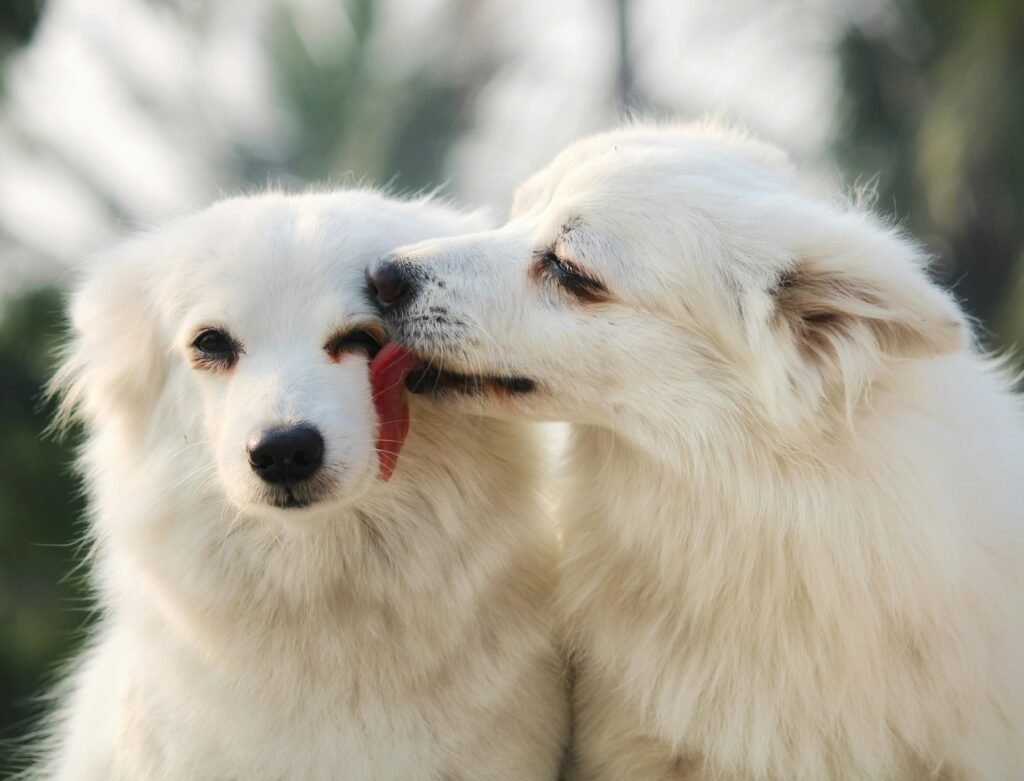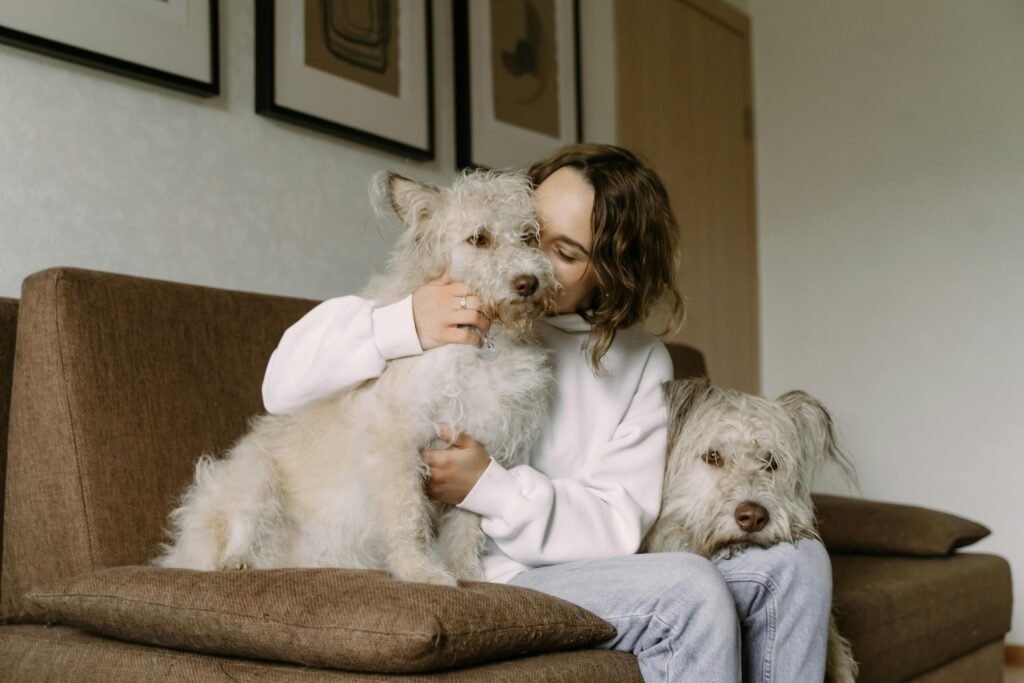As a lifelong dog lover and seasoned pet parent, I’ve often found myself giggling through a barrage of wet, enthusiastic licks right after coming home from a long day. But have you ever paused mid slobber to wonder why do dogs lick your face? This quirky canine behavior isn’t just random it’s a window into your furry friend’s world of emotions, instincts, and social cues.
In this guide, we’ll dive deep into the reasons behind those face-licking frenzies, drawing from evolutionary biology, veterinary insights, and real-world pet dynamics. Whether you’re a new puppy owner or a veteran of sloppy greetings, understanding this habit can strengthen your human-canine companionship and make those licks even more meaningful.
Backed by experts in canine communication, we’ll explore everything from affectionate face licks to subtle stress-relief laps, while touching on practical tips for training your dog to keep things hygienic and harmonious. Let’s lick this topic clean! For more expert-backed insights, check out the American Kennel Club’s guide on dog licking.
The Evolutionary Roots of Dog Licking: A Blast from the Pack Past
To grasp why your dog targets your cheeks and chin with such precision, we need to rewind to our dogs’ wild ancestors. In wolf packs—the hypernyms of modern domestic pet interactions, puppies would nudge and lick their mother‘s muzzle to trigger regurgitation of food, a survival tactic for nourishment. This mammalian grooming ritual evolved into a broader form of animal social behaviors, where licking became a signal of trust and bonding. Dive deeper into this instinct with PetMD’s explanation of canine origins.
Fast-forward to today: Domestication amplified this through neoteny, where dogs retain puppy-like traits into adulthood, making face licking a perpetual “hello” from your ever-youthful companion. It’s no wonder submissive muzzle touches feel like a heartfelt embrace Your dog’s olfactory scent receptors are decoding your unique aroma, blending saliva exchange in pets with emotional reciprocity. When a dog is licking in this way, it’s often the first sign that your dog trusts you deeply as part of the family.
7 Common Reasons Why Dogs Lick Your Face (And What They Really Mean)

Your face is a hotspot for captivating smells and tastes, from meals residues to herbal frame oils. Dogs, with their acute feel of smell, are curious approximately those scents. Licking your face is their manner of exploring and collecting records approximately you.
Not all licks are created equal. From joyful jumps to gentle laps, each exploratory tongue flick carries a message. Here’s a breakdown of the most frequent culprits, infused with dog affection signals that go beyond the surface. Pay attention to context—if your pup starts licking suddenly, it might reveal a shift in their dog feeling.
1. Pure Affection: Your Dog’s Version of a Hug
At the heart of many dog face kissing sessions is love—plain and simple. When your pup plants one on you, it could release oxytocin, the “cuddle hormone,” fostering that unbreakable pet bonding we all crave. Think of it as their way of saying, “You’re my pack leader, and I’m smitten.” This is a classic sign of affection, especially from Labs and Golden Retrievers, known for their effusive personalities, often amp this up into full-face smooches. Explore affection in canine behavior via The Spruce Pets’ detailed breakdown.
2. Greeting You Like Royalty
Ever notice the lick-fest intensifies at the door? This is your dog’s ritualized welcome, echoing those ancient pack reunions. It’s a social lubricant in pack hierarchy signals, helping re-establish bonds after separation. Puppies especially excel here, turning every homecoming into a gustatory skin tasting adventure where the dog s mouth becomes a tool for joyful reconnection.
3. Tasting the Salty Goodness (Yes, It’s Your Sweat)
Blame biology: Human faces are salty treasure troves, thanks to facial sweat pores and lingering food bits. Your dog’s tongue papillae—those bumpy taste sensors—can’t resist. Morning licks? That’s prime time for overnight bacteria buildup, making your mug an irresistible snack bar.
4. Submission and Appeasement: “Please Don’t Be Mad!”
In the doggy dictionary, a soft lick is a peace offering, signaling “I’m no threat” to higher-ups in the pack. If your pooch pairs it with averted eyes or a tucked tail, it’s classic submissive muzzle touches. This licking instincts trait helps de-escalate tension, turning potential scuffles into snuggles, and serves as another sign that your dog is seeking harmony.
5. Stress Relief: Licking as Self-Soothing
Anxious about thunderstorms or vet visits? Your dog might turn to your face for comfort, as the repetitive motion triggers endorphins. This stress-relief laps behavior mimics how mom dogs groom pups, providing a sense of security in our chaotic world. If the dog is licking more during tense moments, it could be a key indicator of underlying dog feeling anxiety.
6. Grooming You (Because You’re Family)
Dogs aren’t just self-cleaners; they’re pack groomers too. A gentle face grooming behavior swipe removes debris or soothes irritation, strengthening ties. At bedtime, it’s often a wind-down ritual, helping both of you relax amid the canine saliva glands‘ enzymatic magic.
7. Attention-Seeking Shenanigans
Bored or ignored? Cue the licks! This exploratory tongue flick is a surefire way to snag your focus—pets learn quickly that slobbers equal scratches. High-energy breeds like Border Collies might escalate it during playtime, where the dog s mouth plays a starring role in demanding interaction.
Is It Safe for Dogs to Lick Your Face? Weighing the Pros and Cons

Those dog face licking moments boost mood, but hygiene matters. On the upside, a dash of canine saliva might enrich your skin’s microbiome, warding off allergies via beneficial bacteria like those in Capnocytophaga strains. It even syncs emotions, per studies on interspecies empathy. For safety details, read PetMD’s take on risks and benefits.
Downsides? Bacteria transfer risks rise for immunocompromised folks, and toxic skincare ingredients could harm your pup. Quick fix: Rinse post-lick and opt for pet-safe lotions. If your dog’s licks turn obsessive, it might flag allergies or digestive woes—time for a vet check on excessive licking.
Breed, Age, and Lifestyle: What Influences Your Dog’s Lick Quota?
Not all dogs are lick-a-holics equally. Affectionate breeds like Labrador Retrievers lead the pack, while aloof ones like Akitas keep it minimal. Puppies lick voraciously for socialization; seniors ramp it up for comfort amid joint aches or cognitive fog. Lifestyle tweaks? More exercise curbs attention-seeking laps, while puzzle toys redirect licking instincts.
How to Curb Excessive Face Licking Without Breaking Hearts
Love the licks but hate the mess? If excessive licking becomes an issue, start with redirection: Swap face time for a LickiMat smeared with peanut butter, channeling that urge productively. Training your dog to respect boundaries is key teach “enough” with positive reinforcement reward calm sits over slobbers.
For stress cases, try calming chews or gradual alone-time training to ease separation blues. Remember, gentle boundaries preserve your emotional reciprocity in pets without dimming the spark, especially when a lick is a sign of affection.
Final Thoughts: Embrace the Lick, But Listen to Your Pup
So, why do dogs lick your face? It’s a tapestry of canine affection, ancient instincts, and heartfelt hellos that remind us why we share our lives with these incredible creatures. Next time your dog goes in for the kill when the dog is licking with that telltale enthusiasm lean into it; it’s their love language, after all. By tuning into these dog affection signals, you’ll build an even deeper connection, one damp kiss at a time.
Frequently Asked Questions (FAQs)
Why does my dog lick my face more when I cry?
It could be tasting salty tears or sensing your distress via pheromones, offering stress-relief laps as empathy. This starts licking pattern is often a sign that your dog is mirroring your dog feeling.
Is excessive face licking a sign of health issues?
Possibly—watch for paired symptoms like lethargy. Consult a vet to rule out allergies or GI upset, particularly if excessive licking persists.
Can I train my dog to lick my hand instead?
Absolutely! Use treats to reward hand targets, gradually phasing out face contact for a cleaner compromise during training your dog sessions.
Do all dogs lick faces the same way?
Nope—face grooming behavior varies by breed and personality. Energetic types go big; chill ones keep it light, but it’s always a sign of affection at its core.
What if my allergic family member hates the licks?
Redirect to toys and explain the pet bonding benefits—compromise keeps everyone happy, even if it means curbing the dog s mouth‘s enthusiasm!

